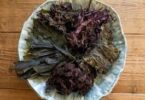Abby Lee
Malaysia isn’t known for its cold weather, but, when the rainy season arrives in November and December, the temperature does tend to drop – to 25C. During the colder months in Britain, meanwhile, I eat lots of peppery broths spiked with chilli and ginger, and often serve them with “cooling” vegetables to balance the heat, as well as hot-and-sour curries and slow-braised meats. These are dishes to warm the soul and keep you going until the sun returns.
Babi chin, or braised dark soy pork belly
A classic Nyonya dish that’s often served at lunar new year, though a more day-to-day version would simply involve garlic and fermented soya beans. It’s a combination of Chinese and Malay cultures, using the former’s soya beans and the latter’s coriander seeds. Two ingredients that will make a big difference here are good soya bean paste and a thick dark soy. If you like, add a few soaked shiitake mushrooms to the braise, for some extra texture.
Prep 10 min
Marinate 1 hr
Cook 1 hr 45 min
Serves 4
For the braise
600g skin-on pork belly, cut into 4cm cubes
80ml dark soy sauce
15ml light soy sauce
2½ tsp granulated sugar
1 tbsp vegetable oil, or other neutral oil
200g round shallots, peeled
Salt and sugar, to taste
For the rempah (paste)
20g coriander root (or stalks)
35g peeled garlic
45g long red chilli
2 tbsp coriander seeds
40g soya bean paste (or red miso paste)
Put the pork in a bowl with half the dark soy sauce, toss to coat, then leave to marinate at room temperature for an hour.
Meanwhile, make the rempah. Roughly chop the coriander root, garlic and chilli, put them in a food processor with the remaining paste ingredients and blend smooth.
Mix the remaining dark soy, light soy and sugar in a bowl. Put the oil in a deep saucepan on a medium heat and, when hot, add the paste and stir for five to 10 minutes, until you can really smell the aromatics. Add the pork belly and stir to coat each piece. Pour in the soy sauce mixture, swirl a little water in the bowl to pick up any last bits, and add to the pan with the peeled shallots. Top up the water so the pork belly is almost fully covered, bring to a boil, then turn down to a light simmer, cover and cook for an hour and a half.
Season with salt and sugar to taste (different brands of soy sauce have different flavour profiles), and serve with rice.
Ikan assam pedas, or hot-and-sour fish stew
This classic Malay and Minangkabau dish is very aromatic and moreish, and more of a thin broth than a thick curry. It’s traditionally laced with torch ginger flower, a particular fragrance that’s hard to get in the UK, but the more easily found Vietnamese coriander would finish it off nicely. Don’t be afraid of frying the paste in lots of oil: it’s the best way to bring out the fragrance. Similarly, be heavy-handed with the tamarind – this is meant to be lip-smackingly sour.
Prep 15 min
Cook 1 hr
Serves 4
For the rempah
90g red onion, peeled and roughly chopped
80g lemongrass, green tops discarded, the rest roughly chopped
90g long red chilli, roughly chopped
6g shrimp paste (belacan, ideally; otherwise, Thai kapi is widely available)
8 pieces dried kashmiri chilli, soaked in warm water for 15 minutes
½ tsp ground turmeric
For the fish
100ml vegetable oil, or other neutral oil
20g granulated sugar
1 tsp fine sea salt
140g aubergine, cut into 6cm chunks (they’ll shrink when cooked)
1 plum tomato, cut in half
50g tamarind concentrate (ideally, the light brown south-east Asian type)
120g okra
2 mackerel, cleaned, or 4 x roughly 140g fillets
Chopped mint and coriander, to finish
Put all the paste ingredients in a blender and blitz smooth.
Put the oil in a deep saucepan on a medium heat, then fry the paste, stirring regularly, for about 20 minutes, until the oil separates. Add the sugar and salt, let it caramelise for a couple of minutes, then add the aubergine, tomato, tamarind and 500ml water, bring to a boil, simmer for 15 minutes, then stir in the okra and simmer for five minutes more.
Turn the heat down low, so no bubbles break the surface, then gently poach the fish in the stew for five to seven minutes, until the flesh flakes easily.
Season with extra tamarind, salt and sugar to taste, depending on whether you prefer it more sour, salty or sweet, and serve with rice and chopped mint and coriander.
Chai buey, or mustard green stew
Some of the ingredients are alternatives to traditional ones, but if you have a Chinese supermarket nearby, use salted mustard greens instead of the sauerkraut and kale. Although this is often made using leftover roast meats, it’s a star in its own right and well worth making entirely from scratch.
Prep 15 min
Cook 1 hr 45 min
Serves 4
1 tbsp vegetable oil, or other neutral oil
4 x 280g duck legs
35g piece fresh ginger, unpeeled, cut into 1cm-thick slices
20g peeled garlic, chopped
12 pieces dried kashmiri chilli (about 10g)
50g carrot, cut into 1cm-thick matchsticks
150g turnip, cut into 1cm-thick matchsticks
120g sauerkraut, ideally with no added flavours
70g vine tomatoes, cut into wedges
½ tbsp white peppercorns, dry toasted and lightly crushed
2½ tbsp light soy sauce
1½ tsp salt
70g kale, roughly chopped
2½ tbsp tamarind concentrate (ideally, the light brown south-east Asian type)
Sambal belacan, to serve
Put the oil in a deep saucepan on a medium-high heat, then sear the duck legs all over until they are just slightly darker than golden brown. Remove and set aside, leaving the oil in the pan.
Turn down the heat to medium, add the ginger, garlic and dried chilli, and stir for a couple of minutes so they infuse the oil. Add the carrots and turnips, and stir-fry for three or four minutes.
Add the sauerkraut, tomato, crushed white peppercorns, soy sauce, salt and duck legs, then pour in just enough water to cover the duck (depending on the depth of the pan, you’ll need up to a litre). Bring to a boil, then turn the heat as low as possible, cover and leave to simmer very lightly for about an hour and a half. Ten minutes before the end of the cooking time, stir in the kale and tamarind.
Courtesy: theguardian







